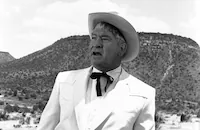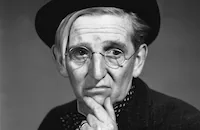Tulsa

Brief Synopsis
Cast & Crew
Stuart Heisler
Susan Hayward
Robert Preston
Pedro Armendariz
Lloyd Gough
Chill Wills
Film Details
Technical Specs

Synopsis
In the early 1920s, in the oil-rich plains of Tulsa, Oklahoma, three ranchers, Native American Jim Redbird, Nelse Lansing and his one-quarter Native American daughter Cherokee, who is known as "Cherry," discover that some of their cattle have died after drinking from polluted streams. Jim and Nelse go to the neighboring Tanner Petroleum Corp. to complain, when suddenly, one of the wells explodes, and Nelse is crushed to death by the well platform. Later, at refinery owner Bruce Tanner's hotel room, Tanner's advisor, Winters, refuses Cherry's demand for $20,000 to replace some prize cattle killed in the explosion. On her way out, Cherry encounters her cousin, hotel employee Pinky Jimpson, who walks her out to the curb. There, drunken oilman "Crude" Johnny Brady hands Cherry a packet of papers, hops into a cab and speeds away. When Pinky tries to return the papers to Johnny the following morning, he learns that Johnny was killed in a brawl the previous night. Pinky then gives Cherry the news and explains that the papers are oil leases which grant her the right to drill on land belonging to Jim and another Native American rancher named Charlie Lightfoot. Later, Tanner arrives, apologizes to Cherry for Winters' behavior and offers her a check for $20,000 in exchange for her newly-acquired drilling rights. When Jim arrives and complains about the pollution, Cherry decides to form her own oil company and take Jim on as a partner. One day, Cherry receives a visit from Johnny's son and heir, famous Princeton athlete Brad "Bronco" Brady. Soon after, in Tulsa, Tanner overhears Brad encouraging Cherry to continue drilling and offers to put up the additional money, with one stipulation: If she does not strike oil within three weeks, the leases will become his. Cherry accepts the challenge and soon strikes oil, but Charlie and some of the other ranchers are dissatisfied with their royalties. At an oil drillers' meeting, they demand additional drilling, dismissing Brad's warning against spoiling their grasslands. When Cherry hosts an opera company reception at her new mansion, the governor attends, and Brad persuades him to appoint a commission on environmental conservation. Later, Tanner persuades Cherry to merge her company with his to form a conglomerate called Tel Oil. Without Jim's approval, Cherry signs an agreement calling for additional drilling on his property. Later, when Jim bars Tel Oil workers from his property, Tanner contacts his friend, Judge McKay, who holds an informal hearing in his office. The judge threatens to appoint a guardian for Jim, who is a ward of the state, after which Jim returns home. There, he finds the carcasses of some of his cattle on the banks of a polluted stream. To test the water for oil, Jim strikes a match, and the stream immediately erupts in flames. After the fire creeps upstream toward the refinery, Pinky, Cherry and Brad arrive. The wells begin exploding one by one, and Jim is injured while attempting to save his remaining cattle. After Cherry rushes to his aid, and they are both trapped, Brad bravely rescues them. Later, Jim apologizes for starting the fire, and when he hears Cherry vow to rebuild with spaced wells and fences to protect the cattle, he gratefully kisses her.

Director

Stuart Heisler
Cast

Susan Hayward

Robert Preston

Pedro Armendariz

Lloyd Gough

Chill Wills

Edward Begley

Jimmy Conlin
Roland Jack
Harry Shannon

Pierre Watkin
Lois Albright
Crew
Del Armstrong
Robert J. Campbell
Howard Fogetti
Irving Friedman
John Fulton
Harvey Gould
Mort Greene
Herschel
Winton Hoch
George Hommel
Nathan Juran
Natalie Kalmus
Curtis Kenyon
Howard W. Koch
Edward Lasker
Arnold Laven
Armor Marlowe
Owen Mclean
Terrell Morse
Richard Mueller
Frank Nugent
Al Orenbach
Charles Previn
Charles Rose
Frank Skinner
Joan St. Oegger
David Tamkin
Helen Turpin
James T. Vaughn
Walter Wanger
Ern Westmore
Richard Wormser
Allie Wrubel

Videos
Movie Clip




Film Details
Technical Specs

Award Nominations
Best Special Effects
Articles
Tulsa
Tulsa was put together by producer Walter Wanger and director Stuart Heisler, the team responsible for Hayward's breakthrough hit, Smash-Up: The Story of a Woman (1947). In the role of a woman sliding into alcoholism, Hayward earned her first Academy Award nomination and established herself as capable of carrying a picture on her own. Her forceful presence often overshadowed the men in her cast, as it did in Smash-Up and again in Tulsa. Even the usually dynamic Robert Preston takes a back seat to Hayward's wildcat in this production, and in a gender reversal, he is seen as the one who must wait patiently for love and marriage while she consumes herself with career ambitions. The war whoop Hayward lets out to celebrate Cherokee's success as an oil producer is just one moment that proves that both Hayward's character and her acting are forces to be reckoned with.
Hayward owed much of her early career success to independent producer Walter Wanger. Tulsa was the fifth picture he produced in three years in which she starred. Later, he produced the movie that finally won her a Best Actress Oscar®, I Want to Live! (1958).
Wanger was a very successful but frequently controversial figure in the film industry. In 1949 he turned down the Special Academy Award given to him for Joan of Arc (1948), because he was incensed over the way Howard Hughes, then the head of RKO, had marketed the film and blamed the box office failure on him. He was also reportedly angry that the film's several Oscar® nominations did not include one for Best Picture. In 1951 he was convicted for attempted murder in the shooting of agent Jennings Lang, who he believed was having an affair with his wife, actress Joan Bennett.
Tulsa received an Academy Award nomination for Best Special Effects. It was shot by Winton Hoch, best know for his Oscar®-winning color cinematography on two John Ford pictures, She Wore a Yellow Ribbon (1949) and The Quiet Man (1952), which he shared with Archie Stout. Hoch also shared an Oscar® with two other cinematographers for Wanger's ambitious but commercially unsuccessful Joan of Arc.
Director: Stuart Heisler
Producer: Walter Wanger
Screenplay: Curtis Kenyon, Frank Nugent; story by Richard Wormser
Cinematography: Winton Hoch
Editing: Terrell Morse
Art Direction: Nathan Juran
Original Music: Frank Skinner, Allie Wrubel (title song, lyrics by Mort Greene)
Cast: Susan Hayward (Cherokee Lansing), Robert Preston (Brad Brady), Pedro Armendariz (Jim Redbird), Lloyd Gough (Bruce Tanner), Chill Wills (Pinky Jimpson).
C-88m.
by Rob Nixon

Tulsa
Quotes
Trivia
Notes
The film opens with offscreen narration, and the opening credits include a dedication to the governor and the people of Oklahoma. Hollywood Reporter news items note that actor Rocco Lanzo and violinist Roger Haines had been added to the cast, but their participation in the released film has not been confirmed. According to a June 17, 1948 Variety news item, some exteriors were shot at the ranch of Oklahoma Governor Roy J. Turner, near the town of Sulpher, Oklahoma. An August 18, 1948 Hollywood Reporter news item reported that other location shooting took place in Tulsa. According to information contained in the file for the film in the MPAA/PCA Collection at the AMPAS Library, the oil well fire scene was shot in a remote section of Oklahoma. The Screen Achievements Bulletin credits Walter Wanger with the original idea, but no other source lists him that way. The film was nominated for an Academy Award in the Special Effects category. A February 12, 1954 Hollywood Reporter news item noted that Carroll Pictures had acquired the film for re-issue, but no further information about this company has been located.














